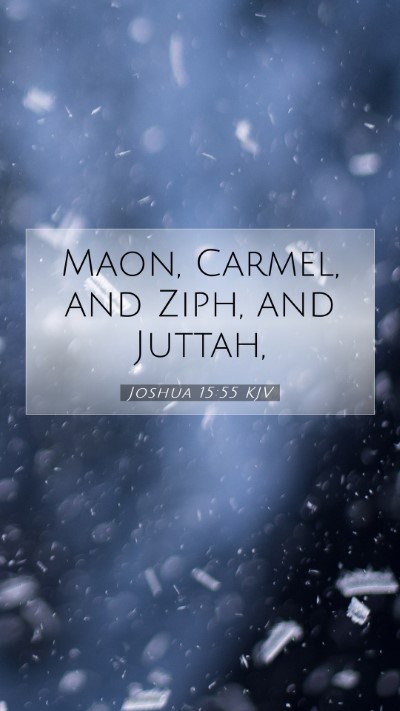Bible Verse Meaning: Joshua 15:55
Bible Verse: Joshua 15:55 - "Maon, and Carmel, and Ziph, and Juttah."
Introduction
This verse is part of a larger passage that details the boundaries and cities of the territory allotted to the tribe of Judah. It offers important insights for those seeking bible verse meanings and bible verse interpretations. Through historical context and theological commentary, we can uncover the significance and implications of this scripture.
Contextual Overview
Joshua, a key leader in Israel's history, was tasked with the divided land of Canaan among the twelve tribes after their exodus from Egypt. Chapter 15 details the land assigned to Judah, which is characterized by various cities including Maon, Carmel, Ziph, and Juttah. Understanding this allocation is essential for Scripture analysis and biblical exegesis.
Commentary Insights
Matthew Henry's Commentary
Matthew Henry emphasizes the geographical significance of these cities. He notes that they were strategically located, illustrating God's providential care in providing land for His people. Each city represents opportunities for worship, community, and security, resonating with the broader theme of divine provision in Scripture.
Albert Barnes' Commentary
Albert Barnes expands on the historical and cultural relevance of the cities mentioned. He suggests that these locations were not only vital for inhabitation but also served as military strongholds. The mention of these cities speaks to the need for God’s people to engage in spiritual warfare and uphold righteousness. The designation of land is a reminder of God’s promises fulfilled.
Adam Clarke's Commentary
Adam Clarke delves into the etymology and historical background of the cities, providing insights into their significance in ancient Israel. He connects these locations to broader themes in the Bible, offering a rich understanding of how the geography corresponds to God’s unfolding plan for Israel. Clarke’s observations highlight the importance of understanding the historical context of Bible study groups and individual bible study insights.
Thematic Significance
The mention of these cities serves multiple thematic purposes in biblical exegesis:
- Divine Provision: The allocation of land signifies God’s faithfulness to His covenant with the Israelites.
- Historical Identity: These cities contribute to the historical identity of the Judah tribe, establishing a sense of place and belonging.
- Spiritual Warfare: The geographical position of these cities denotes areas of potential conflict, reminding believers of the ongoing struggle against sin and evil.
Practical Applications
Understanding this verse allows believers to draw practical applications for their lives:
- Trust in God's Provision: Just as God provided for Judah, He continues to provide for His people today.
- Acknowledge Historical Context: Recognizing the history behind the scriptures enhances understanding and depth in bible study lessons.
- Engagement in Spiritual Warfare: Believers are reminded to be vigilant and prepared to stand firm against spiritual challenges.
Related Bible Cross References
- Joshua 1:3: God's promise of every place that the sole of your foot touches.
- Joshua 18:11: The allotment of land for the tribe of Benjamin, highlighting the distribution of inheritances.
- Hebrews 11:33-34: A reminder of the 'heroes of faith' who subdued kingdoms and were victorious through trust in God.
Conclusion
The verse from Joshua 15:55 serves as a reminder of God’s faithfulness and provision for His people. Through deepening our understanding of scripture and relying on bible study resources, we can apply these timeless truths to our lives. This explanation of Joshua 15:55 not only encourages personal reflection but also provides a foundation for enriching discussions in bible study groups or online bible study.


